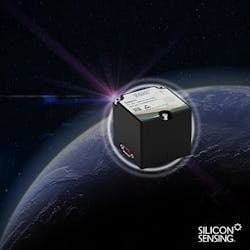Test programme proves IMU performance in space conditions
November 4, 2025 - Silicon Sensing Systems Ltd
After announcing a research partnership in April 2024, Silicon Sensing and the Institute of Science, Tokyo have now completed a test programme evaluating the performance and durability of the DMU41 tactical-grade inertial measurement unit (IMU) in radiation environments similar to those found in space.
The results show that the DMU41 continues to perform well even when exposed to cumulative radiation doses as high as 10 kRad - which exceeds the usual radiation levels encountered during small satellite missions in Low Earth Orbit (LEO).
Testing of a large sample of DMU41 IMUs took place at the Institute of Science Tokyo’s Wakasa Wan Energy Research Centre in Fukui City. The programme evaluated Single Event Effect (SEE) and Total Ionising Dose (TID) on DMU41 units. SEE verified resilience to ionising particles, while TID assessed long-term reliability under radiation. All testing used dose and exposure levels at or above key industry standard thresholds —much harsher than normal operational conditions at LEO.
David Somerville, General Manager, Silicon Sensing comments: “This is an important partnership for us, and these are strong results for our IMU. In this fast-evolving sector performance, size, endurance, power consumption – and cost - are all crucial and these results validate the choice of DMU41 by a growing number of satellite manufacturers. We are confident our technology will significantly improve LEO operations.”
The DMU41 is a robust, 9 degrees of freedom, high performance IMU. It operates in temperatures ranging from -40oC to +85oC, delivering outstanding low noise performance, bias instability and angle random walk. Offering performance comparable to typical fibre-optic gyro IMUs, it comes in a far more compact package – measuring just 50.5×50.5x51mm, weighing under 180g and consuming less than 1.8W. The DMU41 is designed to streamline system integration and help satellite developers shorten their certification process.
Link to full article: https://siliconsensing.com/product-update/dmu41-radiation-hardness-assurance-testing
Link to previous announcement: https://siliconsensing.com/case-study/space-test-programme-science-tokyo
Editor’s Notes: The Institute of Science, Tokyo - Formerly the Tokyo Institute of Technology, the Institute of Science Tokyo is a national Japanese university with a history of over 140 years since its founding. This is a comprehensive science and engineering university that was designated as a national university corporation in March 2018. Approximately 5,000 undergraduate students and 5,500 graduate students study at the three campuses of Ookayama, Suzukakedai, and Tamachi.
Silicon Sensing Systems: Silicon Sensing Systems Ltd is a gyroscope and inertial systems engineering development company, jointly owned by Collins Aerospace and Sumitomo Precision Products. The company was formed in 1999 and is, today, a market leader in silicon, micro electro-mechanical systems (MEMS)-based navigation and stabilisation technology. Many millions of MEMS gyroscopes and accelerometers have been supplied to thousands of customers since the company’s formation.
